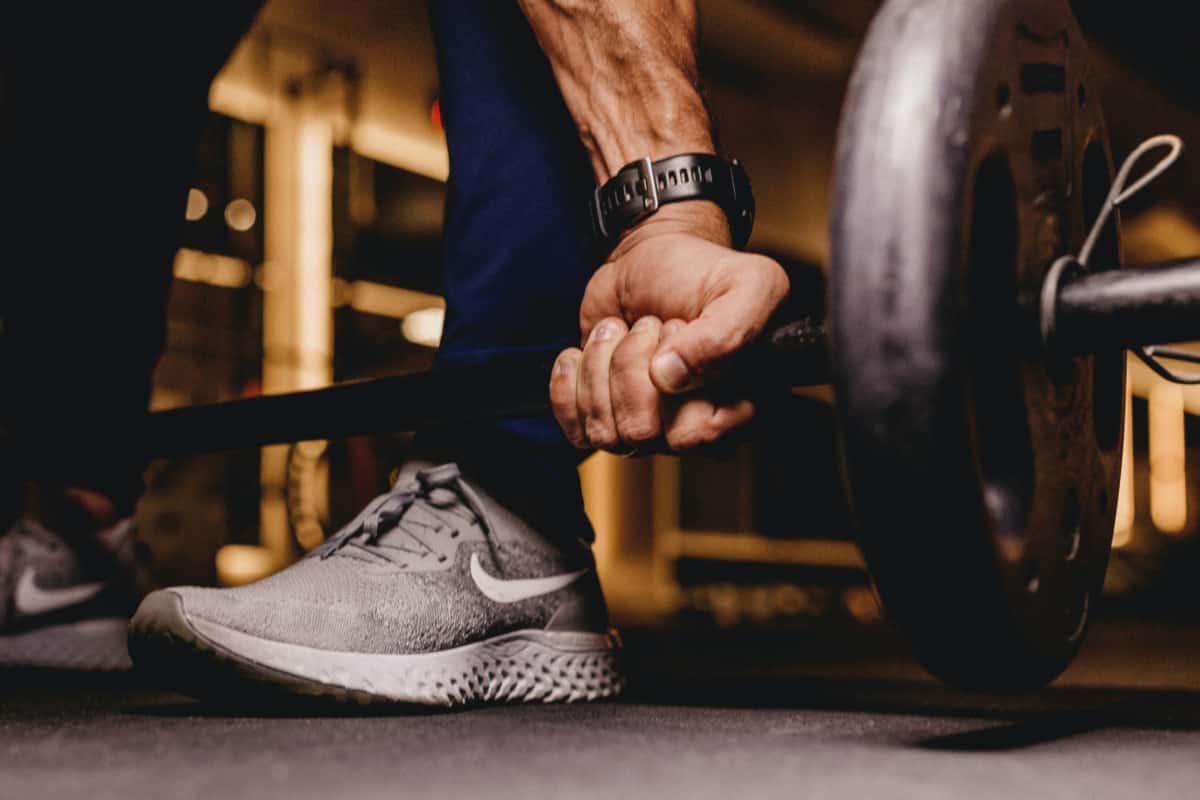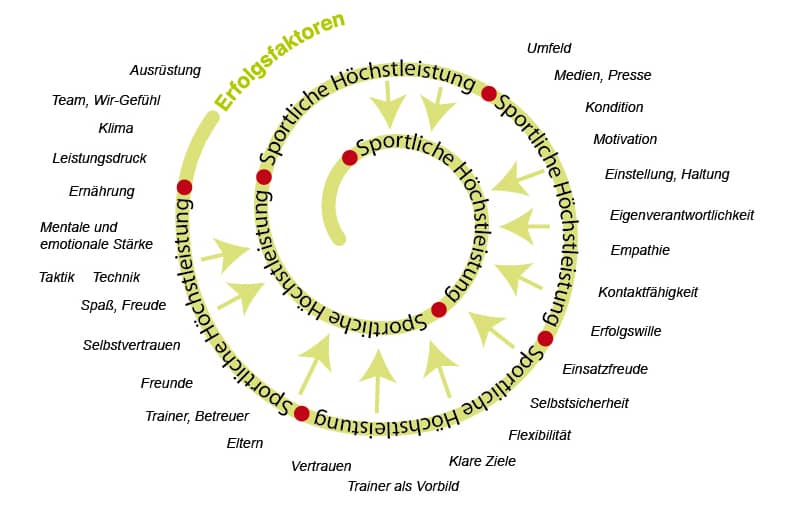
Strong mind, strong performance
This new year is different to any other. Due to the current lockdown, we can’t stick to our usual sporting resolutions and hit the gym with the bucketloads of motivation and enthusiasm.
However, if you take the time to create a structure and schedule, you’ll simultaneously get mentally fit while converting excess energy into athletic performance.
Resolutions that aren’t written down are destined to fail quickly. Here you can write them down.
It’s not just golf and climbing that utilises the mind – our mental state plays a decisive role for success in every sport. Whether it’s persevering through a challenging training session or blocking out disruption, the athlete who can focus and persevere through adversity will always come out on top. Mental and emotional strength is a prerequisite to delivering a top performance.
Incidentally, this matches the opinion of former national soccer goalkeeper Oliver Kahn. In his book Der Erfolg kommt von innen (Success comes from within) he writes: “The inner dialog is a tool that helps achieve a state I describe as ‘strong in the head’ and ‘mentally strong.’ This is the ability to be the master of one’s thoughts and to put oneself in a positive state of deep conviction and confidence.”
But how can you succeed in building this mental strength and reaching your goals?

Our guest blogger Antje Heimsoeth should know, because the graduate engineer is one of the best-known mental coaches and speakers in the German-speaking world.
She founded Heimsoeth Academy in 2003, where she offers seminars, training and coaching in the areas of business, health and sports. Her clients include top athletes as well as international corporations and local businesses.
Amateur and professional athletes are confronted with numerous problems on a regular basis. These include failure, fear of injury, lack of self-confidence, poor concentration, temptation, distraction, internal and external pressure, to name just a few.
The inner attitude and way of thinking is a key element to any athletic performance and is often overlooked. Because the origin of our actions and behaviour lies in the thoughts that precede it, it’s these beliefs and convictions that define success – but they often create obstacles, too.
Negative thoughts and beliefs can act as brake blocks, and often we aren’t even aware of them. Even though many coaches and athletes agree that half of athletic success is mental, most athletes spend less than five percent of their total training time improving their mental resilience.
What is mental training about?
Mental training has a positive effect on self-confidence, self-esteem, self-worth, concentration, motivation, relaxation, regeneration and the achievement of goals.
It helps:
- Overcome blockades
- Limit the negative impact of a mistake or failure
- Perform under pressure
- Find the right level of pressure
- Train the parameters of movement
- Control thoughts and emotions
What does your mental strength depend on?

The subconscious is programmed, so to speak, to successfully manage any situation. For athletes, regular mental training will improve and stabilize mental performance and sports processes, as well as help develop technical and tactical skills, expand your repertoire of movement and therefore achieve more sporting success in the long term.
But how exactly can you build this mental strength? It all starts with goals you set for yourself. Formulating clear, motivating, interesting, active and positive goals is a basic requirement for sports and professional success. The more concrete a goal, the better. As your trainer, I can assess its achievability and help form clear steps to getting there.
“I want to get fitter” is a vague goal and does not create a concrete picture. However, “I’m going to exercise twice a week from now on” is goal-oriented. Appropriate inner images can also help us achieve our goals.
The decisive factor for building mental strength is regular training. With no training, habits won’t be formed that are needed in critical situations. Under stress, we turn to habits that might not be useful, regardless of whether they are appropriate to the situation or not.
The techniques that can be used to build mental and emotional strength are unique to the individual. There is no recipe for success. Rather, mental training is a toolbox from which everyone can choose the tool that suits them best. Method and application depend on the athlete and coach, not the other way around.
Training mental strength
It happens to the best of us – despite top preparation, you don’t perform at your best. But that phenomenon can be changed if you train your mental strength. Antje Heimsoeth shares her tips to get started with mental training:
1. Relaxation and regeneration
No one, not even competitive athletes, perform at their best all the time. If you want to be capable of top performance, you have to allow yourself phases of relaxation and regeneration in between.
Exercise, relaxation exercises, ten minutes of quiet with a cup of tea, daydreaming, lazing around, listening to music or reading a good book will help to clear your head.
Sports, especially gentle endurance training, as well as exercise such as yoga, tai chi or qigong contribute significantly to relaxation. The most important thing is regularity and, in addition, fixed time-outs in everyday life.
2. No power to the downward spiral!
Take time to process performance setbacks and disappointments – otherwise a downward spiral is set in motion. In the long run, this can lead to blockages and more poor performances.
So once your analysis of what went wrong is complete, you should turn your gaze forward again. When and where is there another opportunity to do better?
The sooner you can check off a defeat and learn from it, the more positive you will feel and the less fear you will have when tackling your next challenge.
3. Gratitude
“Gratitude is the fastest way to happiness.” (Barry Neil Kaufman, psychology professor).
Every day, preferably in the evening, sit down quietly and write down things you are grateful for or that brought you joy that day.
4. Rituals
Every sportsman has a pre-game ritual, whether they ski, run or play basketball. Rituals are a very important psychological component for inner stability. Rituals structure and order the processes of our lives and offer us the opportunity to find safety, peace and security. So develop your own rituals to help you feel secure and positive.
5. Concentration
What do you concentrate on during difficult tasks or under pressure? Can you focus on the task, or do you get easily distracted when it matters?
Stay focussed! Don’t let yourself be interrupted by anything. Focus with all your senses on the present, the NOW. Because one thing is for sure: the only thing you can really influence is the present.
6. Control through self-instruction
The stronger you are mentally and emotionally, the less fear and self-doubt you’ll experience on your journey to achieving your goals. In this way you will achieve the extraordinary. This includes a deep conviction of your own abilities and skills. Be convinced that you can deliver an optimal performance at the required time by keeping positive images in your mind and reflecting on your strengths.
In situations where performance is important, counter your own perfectionism with optimism and push yourself with a positive attitude!
Those who train mentally will be rewarded many times over
To conclude – if you train continuously mentally and emotionally, you can meet athletic challenges with clarity, motivation, goal orientation, self-confidence and composure. And with this, you’re guaranteed a fantastic start to the new year!
Picture © Orhidea Briegel



Comments